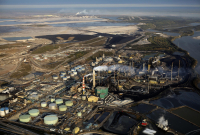Support strong Canadian climate journalism for 2025
Canada’s oil producers have once again lowered their long−term production estimates as low oil prices take a toll on oilsands growth.
The Canadian Association of Petroleum Producers says it now estimates Canada will produce 4.9 million barrels per day by 2030 — a 28 per cent increase from last year’s production of 3.8 million barrels per day, but down 400,000 barrels a day from last year’s forecast.
It’s the third year in a row that CAPP has revised its outlook downward.
CAPP — the oil and gas industry’s main lobby group — says Alberta oilsands are the biggest cause of the lowered outlook even as they continue to drive Canada’s production growth.
The association expects oilsands production to total 3.7 million barrels per day by 2030, up 68 per cent from 2015.
That’s 300,000 barrels lower than last year’s 2030 oilsands forecast, and 1.5 million barrels lower than what it predicted in 2013.
Since 2013, the oilsands have seen a number of high−profile projects shelved as companies cut back spending on high−cost projects.
CAPP estimates that since its peak in 2014, capital spending in Canada’s oil and gas industry has dropped $50 billion with an expected $31 billion in spending this year.
Employee ranks have dropped along with the lower spending, with direct and indirect job losses down 110,000 from the 550,000 peak in 2014, CAPP estimates.
Despite the reduced growth and spending, CAPP chief executive Tim McMillan says Canada’s energy industry still needs more pipelines since the infrastructure is already running near full capacity.
He said the CAPP forecast shows the need for more capacity as the oilsands are set to continue to grow, and is optimistic that the necessary pipelines will be approved.
"We have seen a substantial growth in our pipeline capacity over the last decade and there’s an expectation that we will continue to see that growth keeping up," said McMillan.
He said the National Energy Board’s approval of the proposed near−tripling of capacity of the TransMountain pipeline between Edmonton and Burnaby, B.C., shows progress continues to be made.
"Having the NEB now approve Kinder Morgan I think is a very important step forward, probably one of the most important in that decision−making process. So I think there’s reason to be hopeful at this point," said McMillan.
The pipeline debate has become highly polarized in recent years, with opposition on a number of fronts from environmental groups, First Nations communities and landowners.
Greenpeace campaigner Keith Stewart said in an email that the government should encourage a transition to green energy, rather than an expanded oilsands.
"I can understand why oil companies want Canadians to believe our energy future is tied to what they are selling, but our governments should acknowledge that there is no market for this additional high carbon oil in a world that is acting on climate change," said Stewart.



Comments